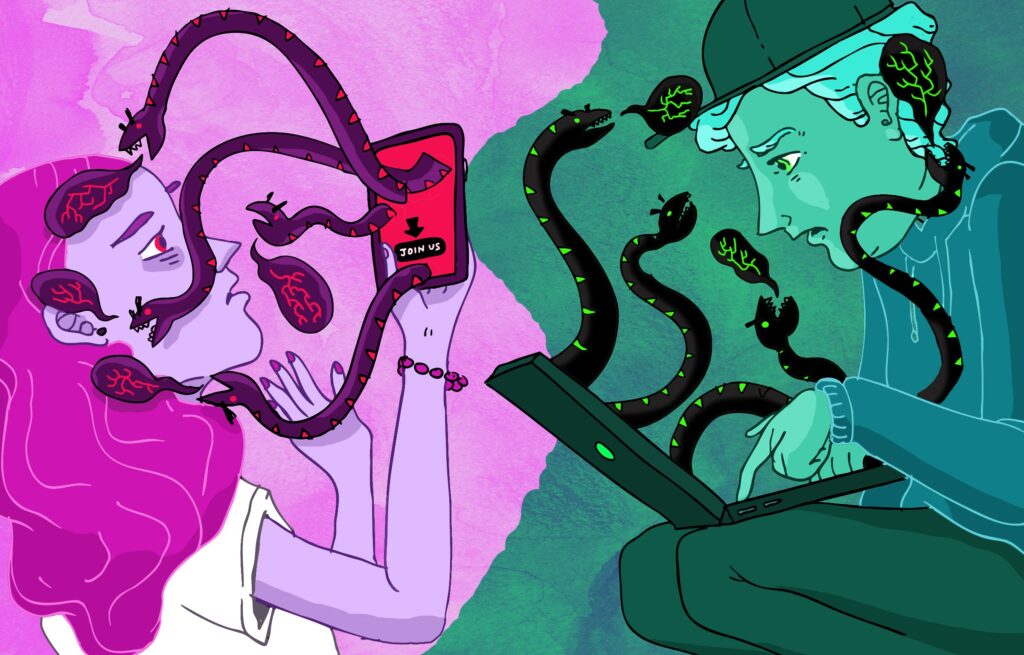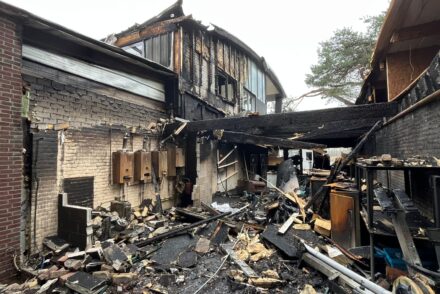Philosopher Ruth Tietjen: ‘Loneliness makes you vulnerable to radicalization’
From incels to jihadi brides: loneliness plays a significant role in radicalization, warns philosopher Ruth Tietjen. ‘It’s not just a personal problem, but also a risk to our democracy.‘

Why are young men drawn to the incel movement? How can loneliness be used as a weapon by extremist groups? And what role does gender play in how we understand radicalization?
Those are the questions philosopher Ruth Tietjen explores. Tietjen is a university lecturer at the Faculty of Humanities and researches current political and social issues, such as fanaticism, extremism, (de)radicalization, religious fervor, and misogyny. Univers spoke with Tietjen about the role of loneliness in political radicalization.
Why is it so important to study loneliness?
‘The prevailing idea is that loneliness is primarily a personal, individual experience. A personal problem that you have to solve yourself. Moreover, people also experience that loneliness as their own fault, which makes it even more painful: they not only feel lonely, but also responsible for that loneliness.
‘In the Netherlands, there’s attention to loneliness, for example, through government campaigns like ‘One Against Loneliness.’ These focus primarily on the health risks. This is important, because loneliness is detrimental to your mental and physical health.
‘But we also need to look beyond that. Loneliness can, for example, make people more susceptible to radicalization or authoritarian ideas. So it’s also a risk to our democracy, and we must also view it as a political and social issue.’
How important is loneliness in relation to radicalization?
‘There are multiple reasons for radicalization, and loneliness is sometimes one of them. For example, loneliness can be a driving force: people feel excluded or meaningless and seek connections with extremist movements that offer them a sense of belonging or purpose.
‘Moreover, some extremist groups or authoritarian regimes use loneliness as a tool. They recognize it as a vulnerability and deliberately use it to connect with others. Online, this plays a major role: people who feel socially isolated are approached with stories that validate their feelings and provide direction, gradually drawing them into a radical worldview.
‘An example is the online misogynistic incel movement. There, sexual or emotional loneliness is not only discussed but used as a justification for certain demands, such as the ‘right’ to love, sex, or recognition for women. In extreme cases, members even use these feelings as an excuse for violence. Here, loneliness is seen not only as a psychological problem, but as the basis for radical ideologies and actions.’
Why did you choose to focus your research specifically on incels and women who joined ISIS?
‘The research began with the incel movement because it’s perhaps the clearest example: they explicitly thematize feelings of loneliness. It’s a core component of their worldview and forms the basis of their misogynistic ideology.
‘We examined their manifestos and online communication, among other things. The starting point is often a sense of loss: the involuntary lack of sex or intimacy. This usually involves heterosexual relationships, often with racial overtones, such as the desire for white women. This loneliness is translated within the movement into a narrative that justifies their ideology and in extreme cases, violence as well.
‘We also looked at female Western ISIS supporters because we wanted to understand whether and how loneliness also plays a role there. We compared this with so-called lone actor terrorists: people who independently plan and carry out an attack. ‘Being alone’ is not the same as ‘feeling lonely,’ but the connection is interesting to investigate.
‘It’s striking how differently male and female extremists are framed. Male perpetrators are often called ‘lone wolves,’ a romanticized image of the solitary, autonomous man who resorts to violence. For women, it’s more often about ‘jihadi brides,’ which emphasizes seduction and the search for connection. Both examples demonstrate how strongly gender plays a role in how we understand radicalization.’
Is there a difference in how men and women experience loneliness?
‘Yes, we definitely see a difference, although I want to be cautious about that. After all, we looked at a limited group of cases, and the types of sources we used vary greatly.
‘Among men – such as incels – we primarily see intimate or cultural loneliness. Among women, often converts who joined ISIS, it seems more about alienation, for example, from an Islamophobic society.
‘What’s striking, however, is that men in particular explicitly use loneliness to justify political demands or violent acts. This may be because we analyzed their manifestos, in which they specifically seek to legitimize their actions and inspire others. Such sources are much less available among women. There are far fewer female than male lone-actor terrorists.’
Are you currently seeing new groups emerging that are forming and possibly radicalizing due to loneliness?
‘A movement I’ve been thinking about lately is that of the sovereigns. I’m not sure you can say these people are truly lonely, but the idea of self-determination is central to their ideology. They don’t identify with the government and state in which they live and consider themselves independent. This raises the question of whether there’s also a sense of not belonging, exclusion, or loneliness behind it. It seems like a promising phenomenon to me, worthy of further research.’







